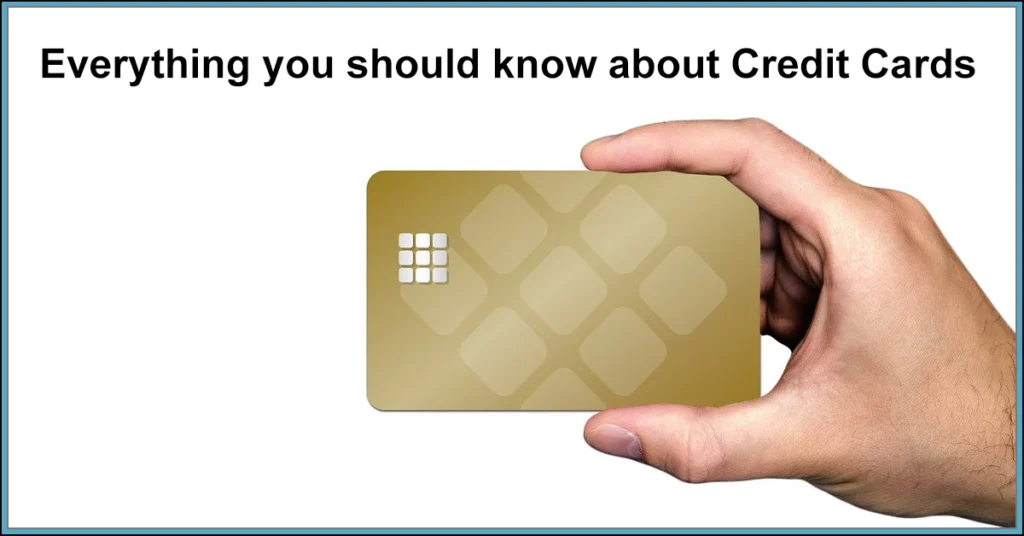Everything you should know about Credit Cards
What's inside?
- 1 Everything you should know about Credit Cards
- 1.1 Types of credit cards available in India
- 1.2 Benefits of Having a Credit Card
- 1.3 Risks and Drawbacks of Credit Cards
- 1.4 Eligibility Criteria for Getting a Credit Card
- 1.5 How to Choose the Right Credit Card?
- 1.6 Tips for Responsible Credit Card Usage
- 1.7 Credit Card Debt Management
- 1.8 Alternative Payment Methods
Types of credit cards available in India
- Standard credit cards: These are basic credit cards that offer a fixed credit limit and interest rate. They typically don’t come with many additional benefits or rewards.
- Rewards credit cards: These cards allow you to earn rewards points, cashback, or other incentives based on your spending. Rewards can be redeemed for merchandise, travel, or statement credits.
- Co-branded credit cards: These cards are issued in partnership with specific retailers, airlines, or other brands. They often offer enhanced rewards or discounts when used with the co-branded partner.
- Secured credit cards: Designed for individuals with limited or poor credit histories, secured credit cards require an upfront refundable security deposit, which serves as the credit limit.
- Student credit cards: These cards are tailored for college students and typically have lower credit limits, fewer fees, and incentives for maintaining good grades.
- Travel credit cards: These cards offer travel-related benefits such as airport lounge access, travel insurance, and rewards for booking flights or hotels.
Benefits of Having a Credit Card
Convenience and security: Having a credit card can make your life much more convenient, especially when you start your first job. Instead of carrying cash everywhere, you can simply swipe your card for purchases, making transactions safer and easier to manage. Credit cards also offer additional security features like fraud protection and the ability to dispute unauthorized charges, giving you peace of mind.
Building a credit history: As a new professional, getting a credit card can be an excellent way to start building your credit history. Credit history plays a crucial role in determining your creditworthiness for future loans, mortgages, and even rental applications. By using your credit card responsibly and making timely payments, you can establish a positive credit record, which can open doors to better financial opportunities down the line.
Reward points, cashback offers, and other privileges: Many credit cards offer attractive rewards programs, allowing you to earn points, cashback, or other benefits on your spending. These rewards can be redeemed for travel, merchandise, or even cash. Additionally, credit cards often provide exclusive privileges like discounts, access to airport lounges, and other perks, making them valuable tools for both personal and professional use.
Interest-free credit period: Credit cards typically offer an interest-free grace period, usually ranging from 20 to 50 days, during which you can pay off your outstanding balance without incurring any interest charges. This feature can be particularly useful for managing your cash flow, especially when you’re just starting your career and may have irregular or inconsistent income.
Spend now, pay later (responsible credit facility): Credit cards allow you to make purchases immediately and pay for them at a later date, providing a convenient credit facility. This can be helpful when you need to make essential purchases but don’t have the necessary funds readily available. However, it’s crucial to use this feature responsibly and pay off your balances in full to avoid accumulating high-interest debt.
Supporting emergency needs: Life can be unpredictable, and emergencies can arise at any time. Having a credit card can serve as a financial safety net, allowing you to cover unexpected expenses like medical bills, car repairs, or other urgent needs. This can be especially valuable when you’re just starting your career and may have limited savings.
Making large purchases with EMIs (Equated Monthly Installments): Many credit card issuers offer the option of converting large purchases into Equated Monthly Installments (EMIs), making it easier to manage your expenses over time. This feature can be particularly useful for big-ticket items like electronics, furniture, or even travel, allowing you to spread the cost over several months without putting a strain on your monthly budget.
Risks and Drawbacks of Credit Cards
Overspending and debt accumulation: One of the primary risks associated with credit cards is the temptation to overspend. With a credit card, it’s easy to lose track of your spending and end up accumulating debt that can become difficult to manage. This is particularly true for fresh graduates or those starting their first job, as they may not have developed strong financial discipline or budgeting habits. Overspending can lead to a vicious cycle of debt, where interest charges and late payment fees compound the problem, making it increasingly challenging to pay off the outstanding balance.
High-interest rates on outstanding balances: Credit cards typically carry high-interest rates, especially for those with limited or no credit history. If you fail to pay off your balance in full each month, the outstanding amount will accrue interest charges, which can add up quickly. This can make it challenging to pay off the debt, as a significant portion of your monthly payment goes towards interest rather than reducing the principal amount owed.
Annual fees and other charges: Many credit cards come with annual fees, which can range from a few hundred rupees to several thousand, depending on the card and its features. Additionally, there may be other charges, such as late payment fees, over-limit fees, or foreign transaction fees. These fees can add up and make it more expensive to maintain and use a credit card, especially for those on a tight budget.
Impact on credit score if mismanaged: Your credit score is a crucial factor in determining your creditworthiness and plays a significant role in your ability to obtain loans, credit cards, or even rent an apartment. If you mismanage your credit card by missing payments, maxing out your credit limit, or accumulating too much debt, it can negatively impact your credit score. A poor credit score can make it difficult to obtain credit in the future and may even affect your employment prospects in certain industries.
Potential for fraud and identity theft: Credit cards are vulnerable to fraud and identity theft, which can have severe financial and personal consequences. If your card is lost or stolen, or if your personal information is compromised, unauthorized individuals may be able to make fraudulent purchases or open new accounts in your name. This can result in significant financial losses and can be a time-consuming and challenging process to resolve.
Eligibility Criteria for Getting a Credit Card
Age requirements: In India, you must be at least 18 years old to apply for a credit card. Most banks and financial institutions prefer to issue credit cards to individuals who are at least 21 years old, as they are considered more financially stable and responsible. However, some banks do offer student credit cards or add-on cards for individuals as young as 18 years old, provided they meet the other eligibility criteria.
Income requirements: Credit card issuers typically have minimum income requirements to ensure that applicants have the ability to make timely payments. The income requirements can vary depending on the type of credit card and the issuing bank. Generally, most banks in India require applicants to have a minimum annual income of ₹2 lakh to ₹3 lakh for entry-level credit cards. For premium or high-end credit cards, the income requirement can be significantly higher, ranging from ₹5 lakh to ₹10 lakh or more.
Credit score requirements: Your credit score is a crucial factor that credit card issuers consider when evaluating your application. A good credit score demonstrates your creditworthiness and responsible financial behavior. Most banks in India prefer applicants with a credit score of 750 or higher on the CIBIL scale (range: 300-900). If you have a lower credit score or no credit history, you may still be eligible for a secured credit card or a card with a lower credit limit.
Employment status requirements: Having a stable source of income is essential for obtaining a credit card. Most banks require applicants to be employed or have a regular source of income. If you are a salaried employee, you may need to provide your employment details, such as your designation, company name, and salary slip. If you are self-employed or have a business, you may need to provide income proof, such as bank statements, income tax returns, or financial statements.
How to Choose the Right Credit Card?
Identifying your spending habits and needs: Before you apply for a credit card, take a moment to assess your spending habits and needs. Do you frequently travel for work or leisure? Do you primarily use your card for everyday expenses like groceries and dining out? Or do you plan to use it for larger purchases or consolidating debt? Understanding your spending patterns will help you narrow down the type of credit card that best suits your lifestyle.
Comparing different credit card features: Credit cards come with various features, and it’s important to compare them to find the one that aligns with your goals. Some key features to consider include:
Annual Percentage Rate (APR): This is the interest rate you’ll pay on outstanding balances. If you plan to carry a balance, look for a card with a low APR.
Credit limit: Determine how much credit you’ll need based on your expected expenses.
Rewards programs: If you’re looking to earn rewards for your spending, evaluate the different programs offered, such as cashback, travel miles, or points.
Sign-up bonuses: Many cards offer attractive sign-up bonuses for meeting a minimum spending requirement within the first few months.
Rewards programs vs. low-interest rates: When it comes to credit card rewards programs, you’ll generally have to choose between earning rewards or enjoying a low-interest rate. Rewards cards tend to have higher interest rates, while low-interest cards typically lack robust rewards programs. Consider whether you’re more likely to carry a balance or pay off your balance in full each month to determine which option is better for you.
Annual fees vs. no annual fees: Some credit cards charge an annual fee, while others do not. Annual fees can range from a few thousand rupees to tens of thousands, depending on the card. Premium cards with more perks and rewards often come with higher annual fees. If you’re a frequent traveler or plan to maximize the benefits, an annual fee card may be worth it. However, if you’re a moderate spender, a no-annual-fee card might be more suitable.
Co-branded cards vs. bank-issued cards: Co-branded cards are partnered with specific airlines, hotels, or retailers, and often offer rewards specific to those brands. These cards can be advantageous if you frequently use those brands. Bank-issued cards, on the other hand, offer more flexibility in how you earn and redeem rewards.
Tips for Responsible Credit Card Usage
Setting a budget and tracking expenses: Before applying for a credit card, create a budget that accounts for your income, fixed expenses (rent, utilities, etc.), and discretionary spending. Determine how much you can realistically afford to spend on your credit card each month. Tracking your expenses diligently is key to avoiding overspending and staying within your budget.
Paying bills on time: Late or missed payments can significantly damage your credit score and result in costly late fees and interest charges. Set up automatic payments or payment reminders to ensure you never miss a due date. Paying your balance in full each month is ideal, but if that’s not possible, at least pay the minimum amount due.
Keeping credit utilization low: Credit utilization, the ratio of your outstanding balance to your credit limit, plays a significant role in your credit score. Experts recommend keeping your credit utilization below 30% to maintain a good credit score. If your credit limit is ₹1,00,000, try not to let your outstanding balance exceed ₹30,000.
Regularly monitoring credit card statements: Carefully reviewing your credit card statements each month can help you catch unauthorized charges, billing errors, or signs of fraud. It also allows you to track your spending and identify areas where you might be able to cut back.
Avoiding cash advances and balance transfers: Cash advances and balance transfers often come with higher interest rates and additional fees. Unless it’s an absolute emergency, it’s best to avoid these options as they can quickly lead to mounting debt.
An introduction to better money management: Using a credit card responsibly is an excellent way to build credit history and develop good financial habits. By following these tips, you’ll learn to manage your credit card effectively and avoid the pitfalls of overspending and unnecessary debt. Remember, a credit card is a tool that should be used judiciously to enhance your financial well-being, not a means to live beyond your means.
Credit Card Debt Management
Understanding interest rates and finance charges: Credit card companies charge interest rates on outstanding balances, which can quickly accumulate if you don’t pay your bills in full each month. Interest rates can vary significantly among different credit card issuers, ranging from moderate to exorbitant rates. Additionally, late payment fees and other finance charges can further increase the cost of carrying a balance. It’s essential to review the terms and conditions of your credit card agreement to comprehend the interest rates and associated charges fully.
Strategies for paying off credit card debt: If you find yourself in credit card debt, it’s essential to develop a plan to pay it off as soon as possible. One effective strategy is the debt snowball method, where you prioritize paying off the card with the smallest balance first while making minimum payments on the others. Once the smallest debt is cleared, you can roll over the payment amount to the next largest balance, creating a snowball effect. Alternatively, the debt avalanche method focuses on paying off the card with the highest interest rate first, which can save you more money in the long run.
Debt consolidation options: If you have multiple credit card balances with varying interest rates, consolidating your debt can simplify the repayment process and potentially lower your overall interest rate. Personal loans or balance transfer credit cards with lower promotional rates can be viable options for consolidating your debt. However, it’s essential to exercise caution and ensure that you can commit to paying off the consolidated debt within the promotional period to avoid accruing higher interest charges.
Credit counseling services: If you’re struggling to manage your credit card debt, consider seeking assistance from a reputable credit counseling service. These organizations can work with you to develop a personalized debt management plan, negotiate with creditors for reduced interest rates or waived fees, and provide valuable financial education resources.
Importance of maintaining a good credit score: Your credit score is a crucial factor that lenders consider when evaluating your creditworthiness. Late payments, high credit utilization, and delinquent accounts can severely impact your credit score, making it more difficult and expensive to obtain future credit or loans. By responsibly managing your credit card debt and making timely payments, you can maintain a good credit score, which can open doors to better financial opportunities and lower borrowing costs.
Alternative Payment Methods
Debit cards: Debit cards are linked directly to your bank account and allow you to make purchases using the funds available in your account. They are a convenient and widely accepted payment method, and they can help you avoid accumulating debt. However, debit cards do not offer the same level of protection as credit cards in case of fraudulent transactions or disputes with merchants.
Mobile wallets and UPI: Mobile wallets like Google Pay, PhonePe, and Paytm, as well as Unified Payments Interface (UPI) apps, have gained immense popularity in India. These digital payment solutions allow you to make secure transactions directly from your smartphone, eliminating the need to carry cash or cards. They are particularly useful for small transactions and peer-to-peer payments.
Buy Now, Pay Later (BNPL) services: Buy Now, Pay Later (BNPL) services, such as LazyPay, ZestMoney, and Simpl, offer a convenient way to make purchases and pay for them in interest-free installments. These services can be helpful for larger purchases, but it’s important to manage your finances carefully and ensure that you can meet the repayment schedule.
Pros and cons of alternative payment methods:
Pros:
-
-
-
-
- Avoid accumulating debt and interest charges associated with credit cards.
- Increased control over spending and budgeting.
- Convenient and widely accepted payment options.
- Enhanced security features for digital transactions.
-
-
-
Cons:
-
-
-
-
- Limited ability to build credit history, which can be important for future financial endeavors.
- Lack of consumer protections and purchase protection offered by credit cards.
- Potential for overspending or missed payments with BNPL services, leading to late fees or penalties.
-
-
-



